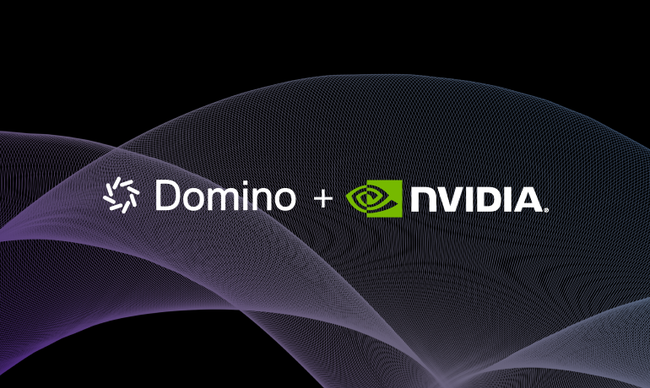Scaling Enterprise AI: Empowering Data Scientists with the Right Tools
Domino2024-10-29 | 20 min read
Introduction
The landscape of business is being fundamentally reshaped by artificial intelligence (AI). Data scientists are not just builders of models anymore; they are architects of intelligent systems that drive core business functions. Today, successful AI implementation requires more than isolated models—it demands scalable, integrated systems that deliver sustained value. This evolution has led to the rise of AI engineering, a discipline focused on deploying, automating, and managing AI at enterprise scale. As Gartner predicts, "By 2026, more than 80% of enterprises will use generative AI APIs or platforms or will have deployed generative AI applications in production environments." [Source: Gartner, "Predicts 2024: AI and Machine Learning"] This underscores the urgency for data scientists to have robust tools.
Consider the transformative examples of Bayer, optimizing crop yields with AI-driven insights, and Allstate, automating claims processing through predictive modeling. These companies illustrate that AI has transitioned from an experimental phase to becoming a cornerstone of strategic operations. Data scientists require platforms that not only facilitate model development but also ensure seamless integration with existing business systems. This is where Domino Data Lab comes in, providing a comprehensive platform that supports the entire AI lifecycle from development to deployment and monitoring.
The Evolving Landscape of Data Science: MLOps and Hybrid Cloud Strategies
Data science today extends far beyond building models. It now encompasses deployment, monitoring, governance, and automation. Without these critical capabilities, even the most sophisticated AI initiatives may struggle to deliver tangible business value. Organizations need to establish structured workflows that ensure models not only perform exceptionally well in production but also maintain strict compliance and security standards. This is where Machine Learning Operations (MLOps) becomes essential. By applying DevOps principles to machine learning (ML), MLOps enables enterprises to standardize processes, enhance collaboration among teams, and significantly accelerate deployment cycles.
A functional MLOps framework empowers data science teams to retrain and update models, ensuring that AI systems remain relevant and effective as data evolves. Companies leveraging MLOps often experience faster iteration cycles and reduced operational friction, which solidifies AI as a dependable and integral business tool. Domino's platform provides a comprehensive environment that supports these MLOps practices, offering integrated tools for model monitoring, versioning, and deployment. This allows data scientists to focus on refining their models and delivering insights, rather than wrestling with infrastructure complexities.
Furthermore, hybrid and multi-cloud solutions are integral to this evolving landscape. For instance, financial institutions frequently adopt hybrid cloud approaches to process sensitive data on-premises while leveraging the cloud for scalable AI training workloads. This strategic approach balances stringent security and compliance requirements with the need for high-performance computing. Enterprises are increasingly diversifying their AI infrastructure to avoid vendor lock-in and dependencies on single providers, ensuring that AI workloads can be executed across diverse environments. This flexibility enables businesses to adapt swiftly and scale their AI initiatives with minimal disruption. Domino's platform is designed to support hybrid and multi-cloud deployments, providing data scientists with the freedom to work with the infrastructure that best aligns with their specific needs and organizational policies.
Comprehensive Modeling Capabilities: Empowering Data Scientists for Diverse Challenges
Enterprises face a myriad of complex business challenges that demand a broad and versatile set of tools. From predictive analytics and risk management to optimization and automation, organizations require robust modeling capabilities to drive data-driven decision-making across multiple functions. Domino's platform provides this extensive toolkit, enabling data scientists to select the optimal approach for each unique challenge, thereby maximizing the impact of their work.
Time series and financial modeling
Organizations rely heavily on time series models to forecast sales, predict demand, and effectively manage financial risks. Platforms that offer support for tools like Prophet, statsmodels, and Darts in Python, or SAS and MATLAB for more specialized solutions, provide data science teams with the flexibility to select the best approach. Financial modeling, in particular, benefits significantly from econometric techniques that empower businesses to assess market trends, detect anomalies, and refine investment strategies. Domino's platform natively supports all of these time series and financial modeling techniques, including both open-source and proprietary tools, granting data scientists the necessary versatility to address diverse financial challenges.
Advanced AI techniques
AI is rapidly evolving beyond traditional supervised and unsupervised learning paradigms. Enterprises are increasingly leveraging self-supervised learning models such as BYOL and DINO for tasks where labeled data is scarce or costly to obtain. Geometric deep learning, powered by libraries like PyTorch Geometric and TensorFlow GNN, is gaining significant traction for applications such as fraud detection and supply chain optimization. Meanwhile, generative models like GANs and VAEs are fueling innovative advancements in synthetic data generation, design automation, and content creation. Domino's platform empowers data scientists to experiment with and deploy these advanced AI techniques natively, providing easy access to the latest tools and technologies in a collaborative environment.
AutoML and optimization
Automated machine learning (AutoML) plays a crucial role in accelerating AI adoption, empowering both non-experts and experienced data scientists to develop and deploy models more efficiently. E-commerce companies, for instance, utilize AutoML to fine-tune product recommendations and pricing strategies without requiring extensive specialized data science expertise. Open-source tools like FLAML, TPOT, and Auto-Sklearn, alongside enterprise-grade AutoML solutions, help accelerate model development and deployment. Additionally, businesses leverage optimization solvers and simulation techniques, such as Monte Carlo methods, and genetic algorithms, to refine decision-making in areas like logistics, finance, and operations
Domino specifically supports genetic algorithms through built-in open-source libraries and frameworks in R and Python, including packages like PyGAD and Evolutionary.jl. Additionally, users can host and run proprietary tools such as SAS, Stata, and MATLAB on Domino. Domino's platform provides AutoML and various optimization techniques, including genetic algorithms, allowing data scientists to automate tasks, expedite model development, and improve overall decision-making processes.
Design of Experiments
A critical aspect of effective data science is the design of experiments (DOE). This involves strategically planning experiments to gather meaningful data and draw reliable conclusions. DOE is essential for optimizing processes, testing hypotheses, and understanding the impact of various factors on outcomes.
Domino supports a wide range of experimental design approaches, providing the flexibility to implement virtually any experimental design methodology through a broad set of libraries, packages, and tools. Users can leverage pre-installed Python libraries such as pyDOE, pyDOE2, scikit-optimize, Optuna, and SALib, as well as R packages like DoE.base, AlgDesign, daewr, and lhs. Additionally, Domino supports proprietary tools such as SAS (JMP, SAS/QC for DOE), MATLAB’s Statistics and Machine Learning Toolbox, and Stata’s experimental design features. Domino allows users to implement any experimental design they conceive. Additionally, Domino’s Professional Services team can provide guidance and support in designing and optimizing experiments based on best practices.
Domino's platform provides tools and an environment that supports DOE, allowing data scientists to design, execute, and analyze experiments efficiently. Features for experiment tracking, data versioning, and collaboration enable teams to conduct rigorous research and validation, ensuring the reliability of their results. The platform’s scalability also supports complex experimental designs, enabling data scientists to tackle challenging research questions and drive innovation.
Specialized AI Capabilities Driving Business Impact
AI is not just about structured data—it extends into areas like audio, video, natural language, and geospatial analysis. These capabilities enable enterprises to automate complex tasks, generate new insights, and improve customer experiences. Domino's platform provides the tools and environment necessary to support these diverse AI techniques, enabling data scientists to work across various data modalities seamlessly.
Audio, video, and image processing
Organizations use AI-powered tools to analyze sound, detect patterns in images, and process video content. Speech recognition models like Wav2Vec2 and SpeechBrain enable real-time transcription and voice assistants, while image recognition techniques in OpenCV and TensorFlow drive automation in quality control and medical diagnostics. In media and entertainment, video processing enhances content personalization and security surveillance. Domino streamlines these processes by providing pre-configured environments with these libraries and tools, allowing data scientists to begin work quickly.
Natural Language Processing (NLP)
From chatbots to sentiment analysis, NLP is transforming customer interactions. Enterprises use transformer-based models such as BERT and GPT to understand text, summarize documents, and generate responses. Businesses in finance and healthcare rely on NLP to extract insights from unstructured data, ensuring compliance and efficiency in regulatory processes. Domino supports these diverse models and frameworks, providing easy access to GPUs and other hardware accelerators needed for training complex NLP models.
Geospatial and Graph Analytics
Companies dealing with location-based data benefit from geospatial analysis using tools like GeoPandas and Folium. Retailers optimize store placement, logistics firms enhance route planning, and urban planners predict infrastructure needs. Graph analytics, supported by NetworkX and PyTorch Geometric, enables fraud detection, social network analysis, and recommendation engines. Domino enables data scientists to scale these analytical workloads with ease, providing access to distributed computing resources and collaborative workflows.
Real-World Success Stories: How Enterprises Are Scaling AI with Domino
AI is no longer an experimental technology—it’s delivering measurable business impact. Enterprises across industries are using AI to optimize processes, improve efficiency, and unlock new opportunities. Domino Data Lab is proud to partner with leading organizations to drive these successful AI initiatives.
Bayer’s agricultural innovation
Bayer leverages AI-driven crop models to improve yield predictions and optimize resource allocation. By integrating weather, soil, and satellite data, AI enables more precise farming decisions, reducing waste and maximizing productivity. Bayer utilizes Domino to scale their data science efforts across multiple teams and geographies.
Allstate’s claims processing automation
Allstate uses predictive modeling to streamline claims processing. AI models assess damage estimates, detect fraudulent claims, and expedite settlements, allowing faster customer responses while reducing operational costs. Domino's platform provides Allstate with the scalability and collaboration tools necessary for their large-scale AI deployment.
BNP Paribas Cardif’s Customer Insights
BNP Paribas Cardif employs NLP to analyze customer feedback and sentiment. AI-driven insights enable the company to improve customer experience, refine service offerings, and enhance engagement strategies. BNP Paribas Cardif leverages Domino to manage their NLP models and ensure consistency in their deployments.
SCOR’s AI-driven risk modeling
SCOR, a leading reinsurance company, integrates AI into risk modeling to assess exposure, optimize pricing, and enhance decision-making. AI-driven simulations allow SCOR to better understand emerging risks and improve underwriting accuracy. SCOR relies on Domino's powerful compute environment to run their complex risk simulations.
Overcoming Challenges in Enterprise AI Adoption with Domino
Despite AI’s immense potential, enterprises often face significant hurdles in scaling their initiatives. The most common challenges include managing infrastructure complexity, ensuring regulatory compliance, and fostering collaboration between technical and business teams. Domino continues to expand its footprint in sectors such as life sciences, financial services, insurance, and the public sector, where auditability, compliance, and data locality are mission-critical. This is, in part, because Domino is specifically designed to address these challenges, providing a unified platform that simplifies AI adoption and scaling.
Challenge 1: Managing Infrastructure Complexity
Enterprises must invest in platforms that offer flexibility across cloud and on-premises environments, ensuring that AI workloads can be executed wherever it makes the most sense for their business. This often means navigating a complex mix of tools and systems. Domino tackles this challenge by providing a unified platform that supports hybrid and multi-cloud deployments. Data scientists can work in their preferred environments, and IT teams can centrally manage infrastructure and resources, reducing complexity and increasing efficiency. Domino’s platform abstracts away the underlying infrastructure, allowing data scientists to focus on their models, not on managing servers and dependencies.
Challenge 2: Strengthening Governance and Compliance
Ensuring that AI models adhere to industry regulations and ethical standards is critical, especially in highly regulated industries like finance and healthcare. This requires standardized processes and clear audit trails. Domino provides robust governance and compliance features, including version control, access management, and audit logs. These tools help ensure that AI models are developed and deployed responsibly, meeting all regulatory requirements. Domino’s platform enables teams to document and track every step of the model development lifecycle, fostering transparency and accountability.
Challenge 3: Bridging the Gap Between Data Science and Business Functions
AI initiatives succeed when technical and non-technical teams align on goals and implementation strategies. This requires effective communication and collaboration. Domino facilitates this collaboration with features like shared workspaces, project documentation, and collaboration tools. These features help bridge the gap between data science and business functions, ensuring that everyone is on the same page and working toward common objectives. Domino enables business users to participate in the AI lifecycle by providing intuitive tools for reviewing and validating models, while data scientists benefit from a clear understanding of the business context.
Pioneering the AI-Driven Future with Domino Data Lab
The AI revolution is not on the horizon—it's already here, fundamentally transforming how enterprises operate and compete. Success in this era hinges on a blend of strategic vision, robust technological infrastructure, and seamless collaboration across teams. To fully harness the power of AI, organizations must align their initiatives with clear, measurable business goals, empower data scientists with best-in-class tools, and establish governance frameworks that ensure transparency, compliance, and ethical deployment.
Domino has continued to mark new milestones in its track record of anticipating enterprise AI needs — from open architecture and hybrid infrastructure to governance and cost control. As enterprises scale AI amidst rising regulatory and operational risks today, Domino’s strengths in MLOps, rigorous control over AI quality, and FinOps help teams continue to move from pilot to production with confidence.
Organizations that strategically invest in scalable platforms, strong governance, and foster cross-functional collaboration will not only keep pace with the rapid advancements in AI but will also emerge as industry leaders. The competitive edge in today's market belongs to those who can efficiently develop, deploy, and manage AI at scale, deriving actionable insights and driving transformative business outcomes.
Domino Data Lab provides the comprehensive platform, flexible environment, and collaborative capabilities that data science teams need to thrive. With Domino, enterprises can confidently move beyond AI experimentation and operationalize their models as core business assets. Now is the time to embrace the future of AI, to innovate boldly, and to lead your industry into a new era of intelligence. By partnering with Domino, you can ensure your organization is ready not just for the future of AI, but to pioneer it.
Domino Data Lab empowers the largest AI-driven enterprises to build and operate AI at scale. Domino’s Enterprise AI Platform provides an integrated experience encompassing model development, MLOps, collaboration, and governance. With Domino, global enterprises can develop better medicines, grow more productive crops, develop more competitive products, and more. Founded in 2013, Domino is backed by Sequoia Capital, Coatue Management, NVIDIA, Snowflake, and other leading investors.
Summary
- Introduction
- The Evolving Landscape of Data Science: MLOps and Hybrid Cloud Strategies
- Comprehensive Modeling Capabilities: Empowering Data Scientists for Diverse Challenges
- Specialized AI Capabilities Driving Business Impact
- Real-World Success Stories: How Enterprises Are Scaling AI with Domino
- Overcoming Challenges in Enterprise AI Adoption with Domino
- Pioneering the AI-Driven Future with Domino Data Lab



